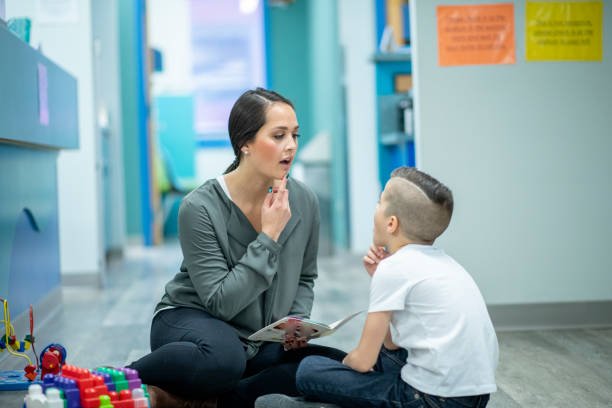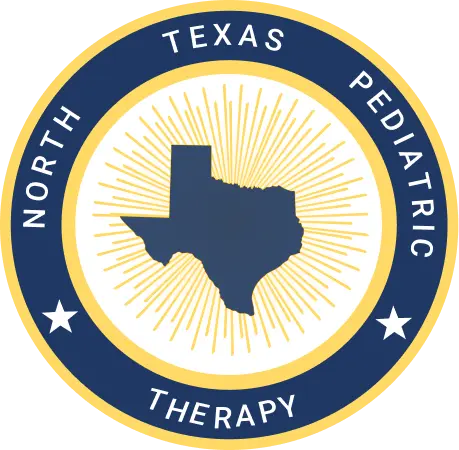Communication is vital to the growth and development of a child because it allows them to build relationships, express ideas, and succeed academically.
However, for some children, communication can be tough. Early signs of speech or language issues are essential for identifying and giving your elementary school-aged child the support they need.
At North Texas Pediatric Therapy, we are dedicated to “Empowering Every Special Child One Step at a Time.” In this guide, we’ll explore the signs a child may have future communication issues and how speech therapy for kids improves your child’s communication skills and self-confidence.

The Role of Speech Therapy in Elementary School
Speech therapy helps the child develop or improve their speech clarity, language comprehension, and communication. It’s not just about speaking clearly—speech therapy also supports children in areas such as:
- Learning how to understand and follow instructions.
- What you have to do is form sentences and increase the vocabulary.
- The ability to use social communication skills.
For elementary school students, speech therapy needs to go beyond just language basics. Often, speech therapy is used for talking and communication skills, which can hinder educational growth and social development.
Why Early Intervention Matters
Because a child’s brain is most adaptable in their early years, it’s important to identify problems early.
We should never ignore early intervention signs, as delays in recognizing speech and language challenges can affect a child’s academic success, social confidence and self-esteem.
With support at the right time, children can learn the skills they need to flourish. So, let’s look at the signs your child may require speech therapy in elementary school.
Common Signs Your Child May Need Speech Therapy
-
Speech Delays
Is your child not meeting typical speech milestones? By the time children reach elementary school, they should be able to:
- Speak clearly enough for most people to understand them.
- Use complete sentences appropriate for their age.
- Tell simple stories and recount events.
If your child struggles with these areas, speech delay help may be necessary to ensure they don’t fall behind their peers.
-
Difficulty Articulating Sounds
When children have difficulty pronouncing certain sounds, such as substituting “w” for “r” (“wabbit” instead of “rabbit”), it’s called articulation issues. Normal mispronunciations for younger kids don’t matter, but it’s a concern when there is consistent trouble with sounds like “s,” “r,” “l,” or “th” in elementary school.
-
Limited Vocabulary or Sentence Structure
By elementary school, children should have a growing vocabulary and be able to form grammatically correct sentences. If your child:
- Uses very basic words (e.g., “want toy” instead of “I want that toy”).
- Has trouble combining words into longer sentences.
- Often, they seem unable to find the right words to express themselves.
These may be signs of underlying language difficulties that require speech therapy for kids.
-
Struggles with Following Directions
An important skill you learn in school is knowing and following multi-step directions. If a teacher says, “Go and get your math book, open it to page 10, and get started with problem one,” your kid should know how to process and follow those steps.
If your kid has difficulty with this, it may be related to receptive language issues, a big area of focus for speech therapy itself.

-
Social Communication Challenges
Social communication, or the ability to interact appropriately with others, is essential for elementary-aged children. Signs your child may have difficulty with social communication include:
- Trouble taking turns in conversations.
- Misunderstanding social cues like facial expressions or tone of voice.
- Struggling to initiate or maintain friendships.
Speech therapy can address these issues, helping children build stronger relationships with peers and adults. Read more about How To Help Your Socially Awkward Kid When They Don’t Socialize Well With Others.
-
Stuttering or Disfluency
Occasional stuttering is normal for young children, but consistent disfluencies, such as repeating sounds, prolonging words, or noticeable pauses, can indicate a fluency disorder. Stuttering can impact a child’s confidence, making it important to seek help for speech delay as early as possible.
-
Voice Issues
If your child’s voice frequently sounds hoarse, nasal, or too loud/soft for the situation, they may have a voice disorder. Speech therapy can help address these concerns, ensuring their voice is clear and healthy.
How Speech Therapy Helps Elementary School Students
Speech therapy programs are tailored to address the unique challenges of each child. Here are some ways a specialized program for speech therapy in elementary school can benefit your child:
- Building Communication Skills: Focuses on improving speech clarity, language comprehension, and expression.
- Enhancing Academic Success: Helps children follow classroom instructions, answer questions, and participate in discussions.
- Boosting Confidence: Equips children with the tools to express themselves, reducing frustration and building self-esteem.
- Supporting Social Interaction: Improves conversational skills, making it easier for children to connect with peers.
Seeking Speech Therapy: What Parents Should Know
-
When to Act
If your child exhibits any of the signs mentioned above, acting sooner rather than later is essential. While some parents may wait, hoping their child will “grow out of it,” delays in seeking speech delay help can create additional challenges as children progress through school.
-
What to Expect from Speech Therapy
When you consult with a speech therapist, they will:
- Evaluate your child’s communication skills through observation and testing.
- Develop an individualized therapy plan based on your child’s specific needs.
- Provide strategies and activities for both in-session and at-home practice.
-
Finding the Right Speech Therapy Program
Choosing the right provider is key to your child’s success. North Texas Pediatric Therapy is committed to offering compassionate, evidence-based care. Our programs emphasize:
- Personalized Plans: Tailored to your child’s unique strengths and challenges.
- Experienced Therapists: Licensed professionals with expertise in childhood communication disorders.
- Family Involvement: Equipping parents with tools to support progress at home.
Also, learn about Tech-Assisted Speech Therapy: How Technology Is Shaping Modern Practices.
Final Thoughts: Empowering Your Child’s Communication
If your kid may require speech therapy, don’t delay. The earlier you start, the more you can do to help your child communicate clearly, connect socially, and achieve educational success.
At North Texas Pediatric Therapy, we’re here to support you and your child every step of the way. Our mission is to deliver transformative therapy, one session at a time, to unlock every child’s potential.
Let’s Work Together!
Contact us today by visiting our website or call at 888-799-7909 to learn more about speech therapy for kids or to schedule an evaluation. Together, we can give your child the tools they need to thrive.


